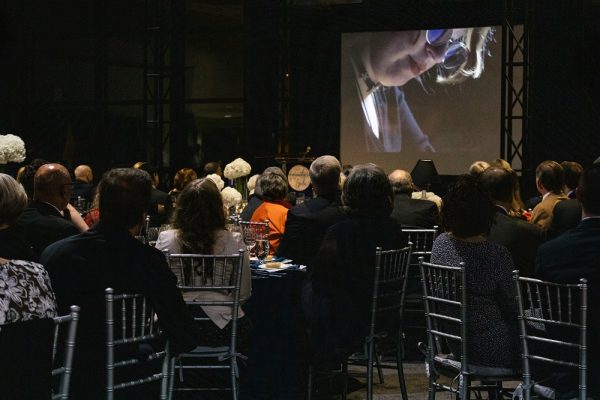
At last year’s WCC Foundation fundraising gala, a short film played showing how foundation funds assists students. One video of Tabetha Chaney, a WCC student and artist, described how scholarship aid from the foundation helped her succeed at WCC. Sara Faraj | Washtenaw Voice
By Lilly Kujawski
Editor
After the WCC Foundation changed its deadline procedure for the WCC Foundation Scholarship, the number of applications the foundation received more than doubled.
The foundation used to follow the same deadlines that the WCC financial aid office used, according to Phil Snyder, associate vice president of college advancement at the foundation. The hard cut-off dates to apply were usually June 10 for the fall semester, Oct. 10 for the winter semester and Feb. 10 for the spring/summer semester.
Beginning July 1 of this year, though, the foundation changed that deadline system.
The foundation still gives students the “soft deadlines” of June 10, Oct. 10 and Feb. 10 to help them remember to apply. After reaching that date, however, the application immediately reopens and remains open until about midway through the semester.
In the 2018 fall semester, the foundation received approximately 550 applications for the Foundation Scholarship, Snyder said. This fall, the foundation received more than 1,300 applications.
The goal was to make the scholarship “more accessible for students,” according to Shana Barker, scholarship and alumni coordinator for the foundation.
New students often don’t find out about the scholarship until they get to WCC, and by that time, the deadline had already passed, Barker said.
This is especially the case for some of the Ann Arbor area high school graduates who end up coming to WCC, Snyder said. In many cases, the deadline passes before high school seniors even graduate.
“The nature of our students is they sometimes don’t know they’re going to be coming to Washtenaw, and all of a sudden they find out that they’re going to go to Washtenaw, so they want to get a scholarship; and up until last fall, we had to say to them… ‘I’m sorry, but you could apply for the winter,’ and that wasn’t any good because then the student couldn’t afford to come,” Snyder said.
Scholarship winners are determined by an external committee, which is an extension of the foundation’s board of directors, and an internal committee, Barker said.
The committees consider an applicant’s GPA, the number of family members in their household, income, any letters of recommendation and the personal statement included in their application.
“We take as much time on our students who we deny as [those] we do approve,” Barker said.
Some students might first be referred to an academic adviser. Other students might not be approved the first semester they apply because the committees need more information and want to see academic progress first. In other cases, foundation staff might have a conversation with a student about their goals to make sure they’re on the right track.
The application process requires a personal statement of academic and career goals. This statement should articulate why a student deserves a foundation scholarship, Snyder said. Sometimes applicants are referred to the Writing Center if they’re having trouble writing this statement, Barker said.
This personal statement is important because the external committee relies heavily on what students write when making the decision, Snyder said.
“Don’t be afraid to share your story; it’s kept confidential,” Barker said. “The more I know about the student, the more I can see what funds are available.”
Students who demonstrate resilience and a particular drive to reach their goals, even in the face of obstacles, tend to stand out to Barker.
The Foundation Scholarship is a need-based scholarship, meaning applicants must be financially eligible. Eligibility is determined by the Free Application For Federal Student Aid (FAFSA), which must be completed in order to apply for the scholarship.
Students who receive the Foundation Scholarship are invited to a luncheon each semester to meet donors. At the end of the semester, awardees are paired with a donor and are asked to write them a thank you note, Barker said.
“It’s like these students have this secret support group that they don’t even know about,” Barker said. “I think we see that when a student does receive a scholarship, it makes them want to perform greater because someone invested in your education.”
The Foundation Scholarship is funded by donations, which are kept in an endowment investment fund. The fund is managed by Commonfund, a Connecticut-based firm that manages nonprofit investments, Snyder said. With an independent company managing the investments, the foundation still has control over the investments, but on a day-to-day basis the funds are kept at “arms-length,” Snyder said.
The Foundation Scholarship is unique because it’s refundable, meaning besides tuition, it can be used for other educational and living expenses. It’s also not a one-time scholarship. Students can apply and receive the scholarship over multiple semesters.
“The cool thing about the foundation is, once we support you, and if you continue to do well academically, we like to support you until you graduate; we like to help you until you finish,” Barker said.
Students are encouraged to meet the “soft” or “priority” deadline given for applications, especially because they’ll find out if they received the scholarship or not before the tuition payment deadline for the semester. Later applicants won’t know the decision until further into the semester.
Foundation Scholarship applications for the winter semester and spring/summer semester are open now and can be found on the WCC website. Award amounts range from $250-1,000, depending on the number of credit hours the applicant is taking.


